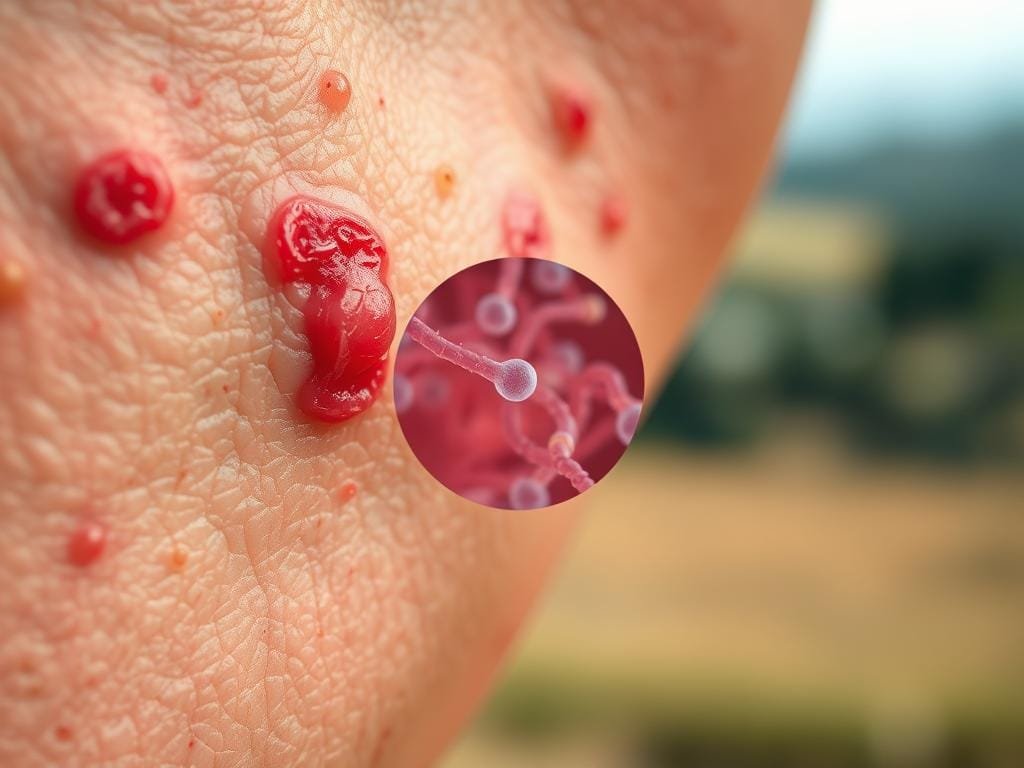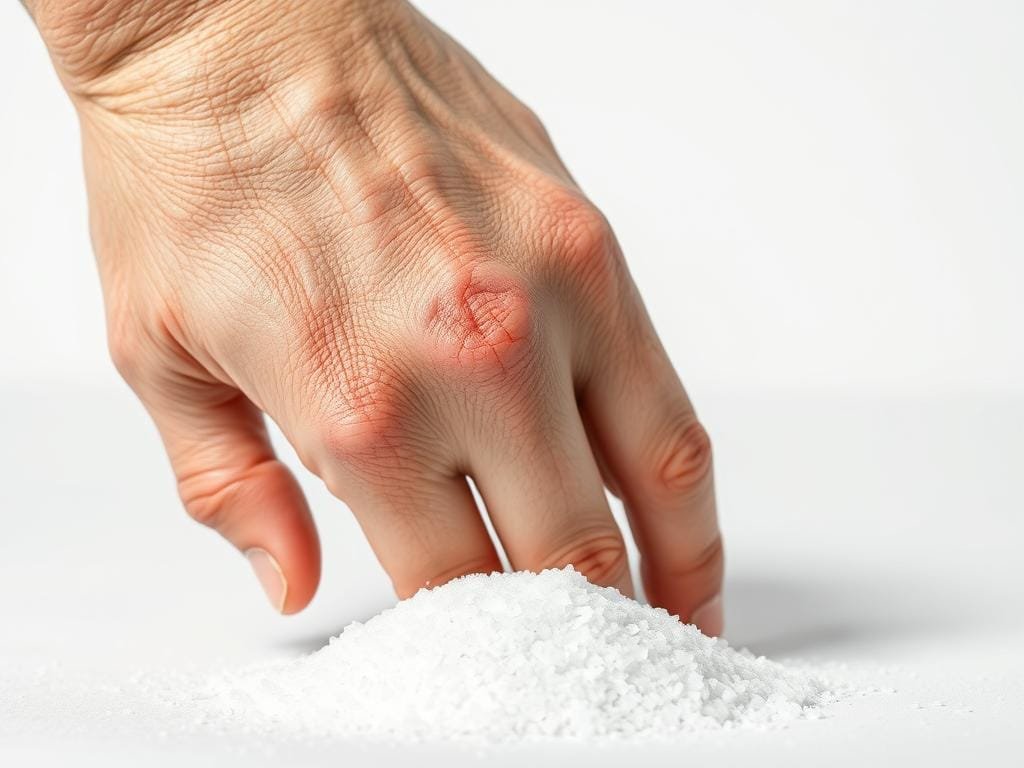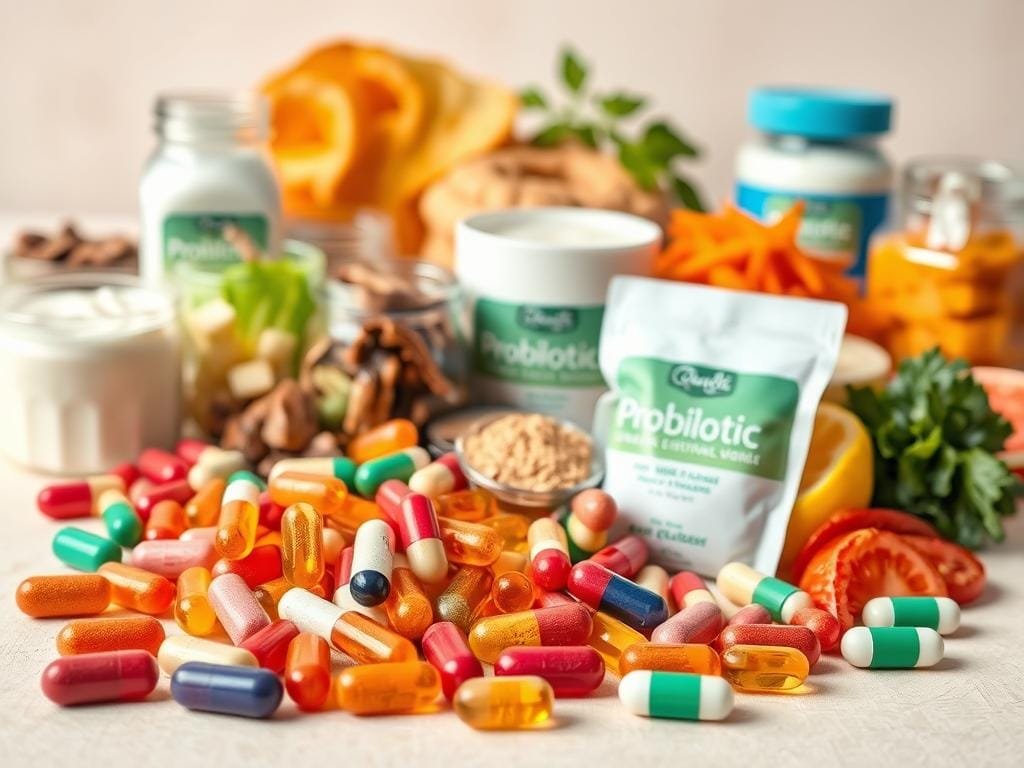Did you know that nearly 40% of adults in the United States face skin issues like acne or rosacea? Research shows a strong link between gut health and skin appearance. An imbalance in gut bacteria, or dysbiosis, can cause many skin problems.
An unbalanced gut microbiome leads to inflammation, affecting your skincare concerns. Learning about the gut-skin connection is the first step to clearer skin.
Table of Contents
Key Takeaways
- The gut-skin connection is vital for overall health.
- An imbalance in gut bacteria can cause skin issues.
- Eating right can help keep your skin healthy.
- Understanding the gut-skin axis is key to effective skincare.
- Feeding your gut microbiome can make your skin look better.
Understanding the Gut-Skin Connection
Your gut and skin are closely connected. Research shows they have a complex relationship that impacts your skin’s health. The health of your gut microbiome is key to your skin’s condition.
What Is the Gut-Skin Axis?
The gut-skin axis is the communication between your gut and skin. Studies found that an imbalance in gut bacteria can cause skin issues like acne and rosacea. Research in the PMC shows how vital a healthy gut microbiome is for good skin.
How Gut Health Influences Skin Conditions
Gut health affects skin conditions in several ways. The gut microbiome makes substances that impact skin health. An imbalance can cause inflammation, a common cause of many skin problems.
Also, the gut and skin share a common origin. They are connected through the gut-brain-skin axis. This involves hormones, neurotransmitters, and immune factors.
Understanding the gut-skin axis helps you improve your skin by focusing on gut health.
The Role of Microbiome Diversity
Your skin’s health is linked to the diversity of your microbiome. A diverse microbiome is key for healthy skin. It affects inflammation and how your body fights off infections.
Benefits of a Diverse Microbiome
A diverse microbiome brings many benefits to your skin. It helps your skin’s barrier work better, reduces inflammation, and boosts overall health. Studies show that people with diverse gut microbiomes have healthier, more resilient skin.
Key benefits of a diverse microbiome include:
- Improved skin barrier function
- Reduced inflammation
- Enhanced immune response
- Better nutrient absorption
Foods That Promote Microbiome Health
Eating foods like fruits, vegetables, and whole grains can boost your microbiome diversity. These foods are full of fiber, which feeds the good bacteria in your gut.
| Food Group | Examples | Benefits |
|---|---|---|
| Fruits | Apples, Berries, Oranges | High in fiber and antioxidants |
| Vegetables | Leafy Greens, Broccoli, Carrots | Rich in fiber and essential vitamins |
| Whole Grains | Brown Rice, Quinoa, Whole Wheat | Good source of fiber and nutrients |
Adding these foods to your diet can help keep your microbiome diverse. This leads to healthier, more radiant skin. Also, try including fermented foods like yogurt and sauerkraut. They have live cultures that can add good bacteria to your gut.
Inflammation and Its Effects on Your Skin
Understanding inflammation’s role in skin health is key for healthy skin. Chronic inflammation causes many skin problems, like acne, rosacea, and early aging. Eating foods that fight inflammation can help your skin stay healthy.
Common Skin Issues Related to Inflammation
Inflammation can cause many skin issues. Some common ones are:
- Acne: Caused by clogged pores and bacterial infection, leading to inflamed skin.
- Rosacea: Characterized by redness, flushing, and visible blood vessels.
- Premature Aging: Inflammation can damage skin cells, leading to wrinkles and age spots.
For more info on keeping your skin healthy with a good skincare routine, check out more resources.

Anti-Inflammatory Foods to Include
Eating foods that fight inflammation can help your skin. Some good foods are:
| Food | Benefits |
|---|---|
| Fatty Fish (Salmon, Sardines) | Rich in omega-3 fatty acids, which reduce inflammation. |
| Turmeric | Contains curcumin, a potent anti-inflammatory compound. |
| Green Leafy Vegetables | Packed with antioxidants and other nutrients that combat inflammation. |
Essential Nutrients for Healthy Skin
Getting healthy, glowing skin is more than just skincare. It’s about eating right too. Vitamins and minerals are key to keeping your skin looking good.
Importance of Vitamins and Minerals
Vitamins A, C, and E, along with minerals like zinc and omega-3 fatty acids, are great for your skin. Vitamin A helps your skin cells renew, making lines and wrinkles less visible. Vitamin C boosts collagen and brightens your skin. For more on these, check out this resource.
If you have sensitive skin, choose your skincare and food carefully to avoid irritation. Eating anti-inflammatory foods can help calm and protect your skin.
| Nutrient | Benefits for Skin | Food Sources |
|---|---|---|
| Vitamin A | Regulates cell turnover, reduces fine lines and wrinkles | Carrots, sweet potatoes, spinach |
| Vitamin C | Boosts collagen production, brightens skin | Oranges, strawberries, bell peppers |
| Omega-3 Fatty Acids | Reduces inflammation, hydrates skin | Salmon, walnuts, chia seeds |
Top Foods for Nourishing Your Skin
Some foods are super good for your skin. Antioxidant-rich foods like berries and leafy greens protect it. Drinking water and eating hydrating foods like cucumbers and watermelon is also key.
Eating a balanced diet with the right nutrients supports your skin’s health. It can make your skin look more radiant. Whether you have sensitive skin or just want healthy skin, the right food can help a lot.
The Impact of Sugar on Your Skin Health
Sugar affects your health and skin. Eating too much sugar can cause inflammation and damage to collagen and elastin. These are key for healthy, young-looking skin.

Collagen Production and Sugar
Eating lots of sugar can harm your skin. It leads to glycation, where sugar binds to collagen and elastin. This forms AGEs, which damage your skin’s structure.
AGEs cause wrinkles, sagging skin, and a dull look. Cutting down on sugar can help keep your skin healthy by reducing AGEs.
Collagen is essential for your skin’s structure. When collagen production drops, you may see fine lines and wrinkles. Knowing how sugar affects collagen can help protect your skin.
Reducing Sugar Intake for Better Skin
Lowering sugar intake is good for your skin. Here are some tips:
- Read food labels to spot hidden sugars in processed foods.
- Choose whole foods like fruits, veggies, and lean proteins.
- Drink less sugary drinks and eat fewer sweets.
- Use natural sweeteners like honey or maple syrup instead of refined sugars.
These steps can help you eat less sugar and improve your skin health. Also, eat foods rich in vitamins C and E, zinc, and omega-3s for better skin.
Reducing sugar is just part of keeping your skin healthy. A balanced diet and healthy lifestyle choices are key to glowing skin.
Probiotics: Your Skin’s Best Friends
Probiotics are key to your skin’s health. They help balance your gut microbiome. Research shows they can improve your skin and reduce inflammation.
Types of Probiotics for Skin Wellness
Some probiotics are better for your skin than others. For example, Lactobacillus and Bifidobacterium enhance your skin’s barrier and reduce inflammation.
Incorporating Probiotics Into Your Diet
You can add probiotics to your diet easily. Foods like yogurt, kefir, sauerkraut, and kimchi are rich in them. If you prefer supplements, make sure they have strains good for your skin.
For more info on natural supplements, check out Boost Healthy Life.

| Food | Probiotic Strains | Benefits for Skin |
|---|---|---|
| Yogurt | Lactobacillus, Bifidobacterium | Enhances skin barrier function |
| Kefir | Lactobacillus, Streptococcus | Reduces inflammation |
| Sauerkraut | Leuconostoc, Lactobacillus | Supports gut health, improving skin |
| Kimchi | Lactobacillus, Bifidobacterium | Rich in vitamins and minerals beneficial for skin |
Hydration and Skin Vitality
Hydration is key for skin health, affecting its elasticity and look. Drinking enough water is vital for healthy skin. It can make skin more elastic and reduce wrinkles.
Water’s Impact on Skin Appearance
Well-hydrated skin looks radiant and supple. Water flushes out toxins and keeps skin cells healthy. This improves skin texture and reduces pores.

For more info on hydration, visit this resource. It talks about water’s health benefits.
Best Hydrating Foods for Your Skin
Drinking water is not the only way to keep skin healthy. Eating hydrating foods also helps. Here are some top choices:
- Cucumbers, full of water and antioxidants.
- Watermelon, hydrating and rich in vitamins A and C.
- Leafy greens like spinach, full of antioxidants for healthy skin.
Eating these foods supports your skin’s health. For tips on self-care, including diet, see this guide.
By focusing on hydration and eating hydrating foods, you can improve your skin’s health and look.
Stress, Gut Health, and Skin Issues
Stress, gut health, and skin conditions are closely linked. When you’re stressed, it can harm your skin.
The Link Between Stress and Skin Conditions
Chronic stress can cause inflammation and damage your skin. Studies show that stress-reducing activities like meditation can improve your skin. Stress can make acne, psoriasis, and eczema worse, making skin care harder.
Stress makes your body release cortisol. This hormone can harm your skin in several ways:
- It can make your skin produce more oil, clogging pores
- It can weaken your skin’s barrier, making it more sensitive
- It can cause inflammation, worsening skin conditions
Managing Stress for Better Skin Health
Reducing stress is key for your overall health and skin. Here are some ways to do it:
- Meditation and mindfulness practices
- Deep breathing exercises
- Yoga and other activities that help you relax
Using these methods can lessen stress’s negative effects on your skin. A healthy lifestyle, including a balanced diet, also supports your skin and gut health.
Stress Management Techniques and Their Benefits
| Technique | Benefits for Skin Health |
|---|---|
| Meditation | Reduces stress, potentially lowering inflammation |
| Deep Breathing | Decreases cortisol levels, improving skin barrier function |
| Yoga | Enhances overall well-being, supporting healthy skin |
By understanding the connection between stress, gut health, and skin issues, you can manage stress better. This can lead to healthier, more resilient skin.
Lifestyle Changes for Improved Skin
Healthy habits can make your skin look better. Your skin shows how healthy you are. Daily choices can help or hurt its glow.
Sleep: The Foundation of Skin Repair
Good sleep is key for healthy skin. It helps fix damaged skin cells and boosts your immune system. Lack of sleep can make your skin look dull and puffy.
Tips for Better Sleep:
- Establish a consistent sleep schedule
- Create a relaxing bedtime routine
- Avoid screens and electronic devices before bedtime
- Keep your bedroom cool, dark, and quiet
Exercise: Boosting Skin Health Through Activity
Exercise is great for your skin. It boosts blood flow, which feeds your skin. It also lowers stress, which can harm your skin.
Simple Ways to Incorporate Exercise into Your Daily Routine:
- Take a brisk walk during your lunch break
- Engage in yoga or Pilates for flexibility and relaxation
- Try bodyweight exercises or follow along with fitness videos at home
- Join a local gym or fitness class for motivation
Adding these lifestyle changes to your day can improve your skin. They support your skincare efforts and make your skin glow.
Delicious Recipes for Glowing Skin
Eating a balanced diet can make your skin glow. Focus on fruits, vegetables, and whole grains. Foods like berries, leafy greens, and whole grains are great for your skin.
Nourishing Breakfast Ideas
Begin your day with a skin-friendly breakfast. Try a smoothie bowl with spinach, banana, and almond milk. Top it with sliced almonds and berries. Or, make overnight oats with rolled oats, chia seeds, and fruit.
Snacks and Meals for Healthy Skin
Healthy snacks and meals also boost skin health. Enjoy carrot sticks with hummus or trail mix with nuts and dried fruit as a snack. For lunch, try a salad with mixed greens, grilled chicken, and citrus vinaigrette. These choices support beauty and skin health.

